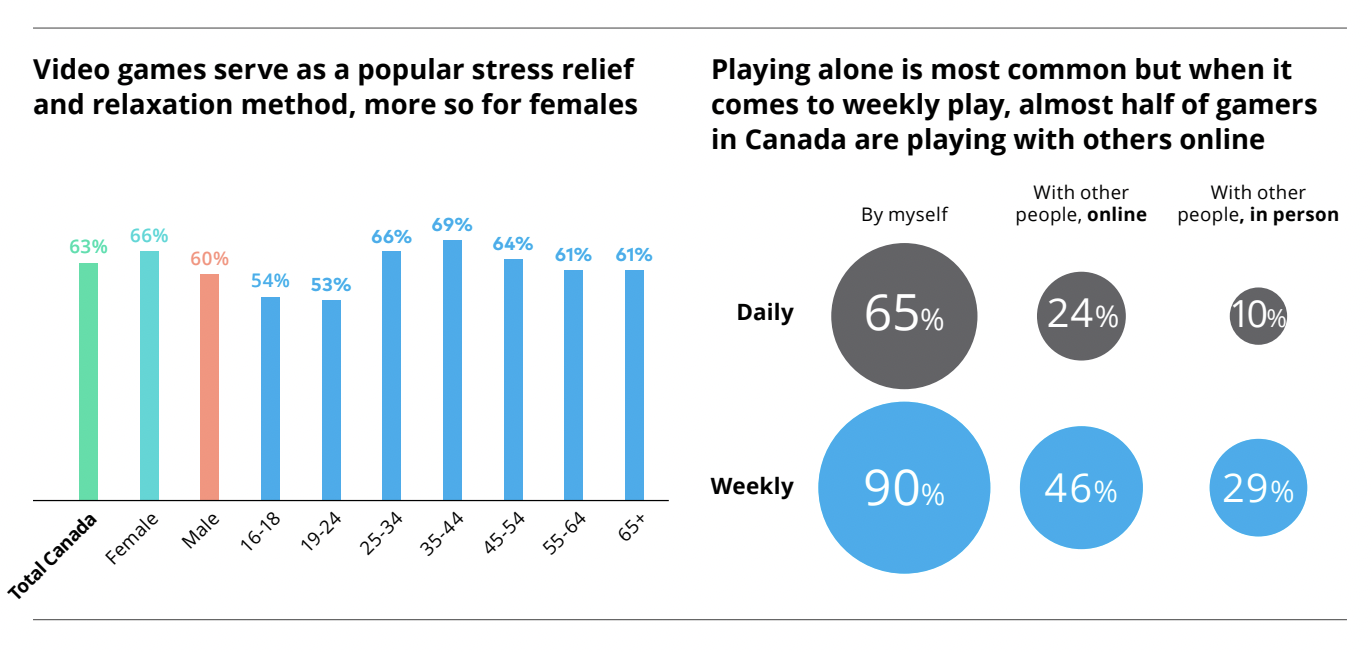
A new global study highlights the different ways people in 12 countries, including Canada, video games have a positive effect on their lives.
Compiled by AudienceNet, the ‘Global Power of Play Survey’ by AudienceNet was issued by national trade associations like the Entertainment Software Association of Canada (ESAC) and its international counterparts. Altogether, the survey gathered responses from nearly 13,000 gamers in Australia, Brazil, Canada, France, Germany, Italy, Japan, Poland, South Korea, Spain, the U.K., and the U.S., and the majority of respondents highlighted a variety of social and emotional benefits from playing games.
Of the 1,013 respondents in Canada, 74 percent said their main purpose for playing games was to have fun, emphasizing the medium’s appeal as a form of entertainment. But Canadians also noted a litany of other reasons, including stress relief (76 percent), reduced anxiety (63 percent), and feeling less isolated and lonely (52 percent). From a social perspective, 70 percent of respondents said games can help them make new friends, while 47 percent noted that games allowed them to meet people they otherwise wouldn’t have.
Overall, 67 percent of Canadians said playing games made them happier, with 54 percent even saying the medium helped them through difficult times in life.
“We know that video games are bringing people together. We know that they’re offering positive outlets for people to increase their enjoyment, to destress, to make friends, to come together with people who have similar interests… All these things are positive,” says Jayson Hilchie, president and CEO of the ESAC.
He notes that the survey reaffirms findings from ESAC’s 2022 ‘Essential Facts’ study, which examined how Canadians have used games to connect, while giving them a global context. But that’s not to say there weren’t any particular data points that still stood out to him.
“I think seeing some of the stats, that 82 percent of Canadian gamers agree that ‘there is a video game for everyone’ — to me, that kind of says it all,” he says. This means everyone from kids and teens to young adults and even seniors.
“[It includes] people like my father when I spent the month in Nova Scotia in August — every morning he got up and played his mobile game with the people that he plays with in his community and all over the place,” he says. He adds that games are “becoming so much more accessible” both the assistive features within them and from hardware, like Microsoft and Sony’s respective Xbox Adaptive Controller and Access Controller for disabled players.

Video games provide stress relief for many Canadians, especially females. (Image credit: ESAC)
“There really is a video game for everyone, and to see that 82 percent of people will say that kind of unprompted tells me that we’re on the right track. Video games are becoming ubiquitous, we’ve always known that, so I think that’s the takeaway.”
Elsewhere, the survey showed that many Canadians feel games have helped them develop skills that can even be applied in other areas of life. In fact, Canadians felt this more strongly than the global average, with 84 percent agreeing that games can improve problem-solving skills (compared to 69 percent globally) and 77 percent saying they can build cognitive skills (vs. 69 percent globally).
While Hilchie says he can’t speak to why that is, chalking it up to Canada being “an innovative nation,” he notes that ESAC is actually working on a new report to demonstrate this. The idea behind this new research project will be to explore how video games have positive impacts in various industries, such as rehabilitation for those with mental disorders.
Ultimately, he hopes that data such as what’s presented in the Global Power of Play Survey will help combat some misconceptions that the gaming industry continues to face.
“One of the things that’s really important is to see, in the face of some of the more negative narratives out there, that no matter what global organizations may say about the video game industry, the players themselves all have positive things to say about their experiences,” he says. “It’s one thing to hear that video games are a negative thing from some of these global organizations. But the evidence suggests otherwise right from the players. And I think for us, going right to the players is the core for us to be able to really paint the picture of how positive video games are.”
One such narrative is the World Health Organization’s (WHO) classification of “gaming disorder” as an illness last year. Last year, Hilchie told MobileSyrup that the ESAC and its global counterparts have been actively working to counter this assertion as part of the Global Video Game Coalition (GVGC), and the Global Power of Play Survey is just one part of those efforts.
“When you’ve got organizations that are on either side of a perspective, that creates, I would say, an interesting and challenging dialogue. But our industry is committed to continuing to be able to put forth research, both qualitative like this, but quantitative through academics and universities and studies that show video games are positive, so we’re going to continue to do that.”
Alongside the questions posed to gamers themselves, the Global Power of Play Survey also references a variety of academic research pieces to support the findings. These include JAMA Network‘s dive into children gamers’ increased cognitive ability, a Tilburg University examination of the relaxing experience of PowerWash Simulator and a 2020 Digital Games and Mental Health study about gaming’s benefits for the elderly.

While people often think games can only be violent and action-packed, there are many relaxing experiences like PowerWash Simulator. Image credit: Square Enix
In general, Hilchie says he’s optimistic that data like this, as well as an increasingly tech-savvy generation, will help further society’s overall understanding of gaming as a whole.
“Luckily for me, I haven’t had that many situations in the last few years where policymakers in Ottawa are saying the last video game they played is Pong. The younger that legislators get, the higher the chances are that they grew up with video games. And so in the 11 years that I’ve been in this job, I’ve really seen an improvement in the understanding of our industry legislators,” he says, noting that the later these kinds of people are born, the higher the chance they’ll have grown up with a game console.
“It just makes the conversation so much easier. Obviously, that trend will continue as time moves on. Everyone will have grown up with the internet, just like everyone will have grown up with video games, and we’re almost there.”
The full Global Power of Play Survey can be found on the ESAC’s website.
Image credit: Shutterstock
MobileSyrup may earn a commission from purchases made via our links, which helps fund the journalism we provide free on our website. These links do not influence our editorial content. Support us here.




